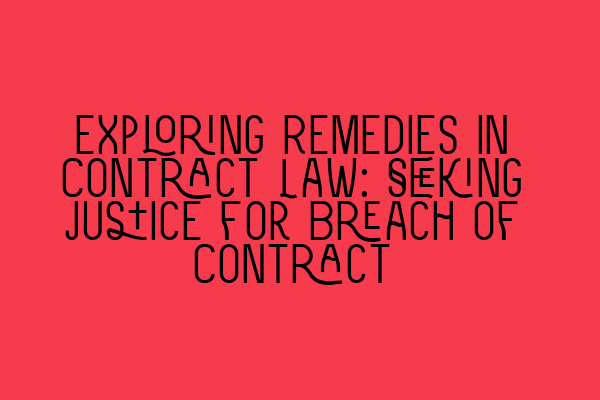Exploring Remedies in Contract Law: Seeking Justice for Breach of Contract
In the world of business and commerce, contracts form the backbone of countless transactions, agreements, and relationships. A contract is a legally binding agreement between parties that sets out the rights, duties, and obligations of each party involved. When one party fails to uphold their end of the bargain, it results in a breach of contract. In such cases, the party who has been harmed may seek remedies to obtain justice and compensation for their losses.
Understanding the various remedies available in contract law is crucial for both individuals and businesses alike. In this article, we will explore the different options for seeking justice in cases of breach of contract and shed light on the processes involved.
1. Monetary Damages
Monetary damages are the most common and straightforward form of remedy sought in cases of breach of contract. The purpose of monetary damages is to compensate the aggrieved party for the financial losses suffered as a result of the breach. There are different types of monetary damages, including:
- Compensatory Damages: These are intended to compensate the injured party for the actual losses they have incurred.
- Consequential Damages: Also known as special damages, these are awarded for indirect losses that were reasonably foreseeable by the breaching party at the time the contract was formed.
- Liquidated Damages: These damages are predetermined and specified in the contract itself. They are agreed upon by the parties at the time of contract formation, and their purpose is to provide certainty in cases of breach.
It is important to note that the amount of monetary damages awarded will depend on various factors, including the nature of the breach, the extent of the loss suffered, and any mitigating circumstances.
For more information on how to prepare for your SQE 1 examination, check out our SQE 1 Practice Exam Questions and SQE 1 Practice Mocks FLK1 FLK2 articles.
2. Specific Performance
In some cases, the injured party may seek specific performance as a remedy. Specific performance is an equitable remedy that requires the breaching party to fulfill their obligations under the contract rather than simply awarding monetary compensation. This type of remedy is typically sought when the subject matter of the contract is unique and cannot be easily replaced.
Specific performance is commonly used in contracts involving the sale of real estate, artwork, or rare collectibles. However, it is important to note that specific performance will not be granted if it is impractical or if there are other adequate remedies available to the injured party.
If you are looking for comprehensive preparation courses for your SQE exams, visit our SQE 2 Preparation Courses and SQE 1 Preparation Courses pages.
3. Rescission
Rescission is a remedy that allows the injured party to cancel or terminate the contract due to the breach. In such cases, both parties are released from their contractual obligations, and any consideration exchanged is returned. Rescission is typically sought when the breach is significant or when one party was induced into entering the contract through fraud or misrepresentation.
It is important to note that rescission may not always be the appropriate remedy, especially if the injured party has already received benefits or if there are other remedies available that better address the situation.
4. Injunctions
Injunctions are another form of equitable remedy available in contract law. An injunction is a court order that prohibits a party from performing certain actions or compels them to perform specific actions. In cases of breach of contract, an injunction may be sought to stop a party from continuing with their breach or to enforce specific performance.
It is important to remember that injunctions are discretionary remedies and are typically granted when monetary damages are inadequate or when irreparable harm would result from the breach.
For a comprehensive overview of the SRA SQE exam dates, please visit our SRA SQE Exam Dates page.
Conclusion
When it comes to seeking justice for breach of contract, individuals and businesses have several remedies at their disposal. Whether it is seeking monetary damages, specific performance, rescission, or injunctions, understanding the available options is crucial in order to make informed decisions and protect one’s rights.
Aspiring solicitors studying for their SQE exams must understand the nuances of contract law and the remedies available to aggrieved parties. For further preparation materials and practice questions, refer to our related articles mentioned above.
Remember, justice can be achieved through the appropriate remedies in contract law. Therefore, it is essential to seek professional legal advice to navigate through the complexities of contract disputes and ensure the best outcome for your case.
